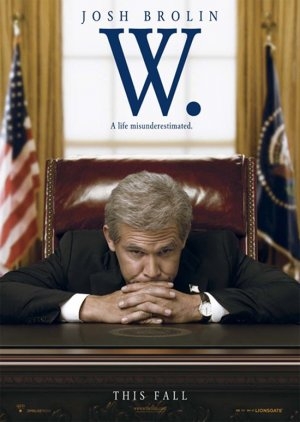 W. (2008, directed by Oliver Stone, 129 minutes, U.S.)
W. (2008, directed by Oliver Stone, 129 minutes, U.S.)
BY DAN BUSKIRK FILM CRITIC
Oliver Stone’s celebrity has eclipsed his own work in recent years, but with his latest, the biopic about our sitting President entitled W., Stone has succeeded in capturing the public imagination in a manner that he hasn’t since 1991’s J.F.K. As his popularity hovers towards record lows, much of America seems to be salivating for The Decider to get his comeuppance. With what is perhaps the most controlled and entertaining film of his career, Stone surprises by delivering a film that is not a partisan smear; he does not resort to cheap shots or unfounded conspiracies to get the job done. Instead he damns the man as superficial and petty by mainly using him and his administration’s own words. Add Josh Brolin inhabiting a near supernatural performance and W. rises to the strata of must-see cinema. It is what all blockbusters seek to be, but few are: a true cultural event.
The story is framed by G.W. looking back at his life from the place he feels most at peace, the outfield of the an empty church-like baseball stadium. The first half of W. is just waiting to have a drinking game built around it. With woozy hand-held camera we see the callow and arrogant young Bush — almost always with a beer in his hand — drifting through life with an ever-present “who gives a shit?” attitude. He’s seen being arrested for vandalizing the stadium after a big win, quitting his oil job with a shrug when caught slouching off, and finally calling out his dad, “Poppy,” to go mano a mano after crashing the car while drunk. It is a picture of a lazy prince that Bush himself has helped to draw, a man with a world of possibility at his feet who could not find direction until religious conversion and the love of a good woman turned his life around.
The way Stone wrangles the facts though (with the help of a sly and witty script from Wall Street screenwriter Stanley Weiser) G.W.’s mid-life rebirth was not about being humbled by the Bible’s teaching, it was a way to throw his cold and unloving father’s (a pitch-perfect James Cromwell) low expectations back into his face. Bush Sr. might have been grooming the Good Son,Jeb , to continue his political legacy but G.W. decides to snatch that role away from him, more out of bitter insolence than for any burning political desire. The grudging respect he wins from his Dad is fleeting though, and as the story told here ends, the collapse of the Iraq war leaves G.W. haunted by the gut feeling that his father’s low opinion of him has ultimately been justified.
How much this pop psych reading of the President is true is any one’s guess yet, for the drama’s sake what is important is that Stone makes it feel true, presenting the Bush legacy of runaway spending, intellectual laziness and human indifference as the inescapable by-product of small man more interested in spiting his father than in serving his fellow Americans. If that is an grossly unflattering conclusion, somehow Brolin’s uncanny portrayal makes it recognizably human, transcending precise mimicry to reveal the clenched hurt and insecurity beneath his good-humored exterior.
While spreading the President’s human flaws across the dissection table may sound too depressing to serve as  entertainment, a smorgasbord of first-rate actors breathe life into the administration’s rogue gallery, giving W. a rich quilt of opportunities for comedy and drama. All the over-sized egos are here: Richard Dreyfuss as the dark sorcerer Dick Cheney, occasionally emerging from the shadows to run the dark business of government past the distracted Prez; Toby Jones as a gleefully manipulative Rove; Scott Glenn as a crotchety, condescending Rumsfeld; and Thandie Newton as a prissy and ineffectual Condoleeza Rice. We’ve watched these smug characters hold court in front of news cameras for years now (it’s also a gas to see former Daily Show regular Rob Corddrey as a compliantly clueless spokesman Ari Fleischer), how humanizing it is to see them huff and puff and scratch their way through policy meetings with their misguided assumptions laid bare.
entertainment, a smorgasbord of first-rate actors breathe life into the administration’s rogue gallery, giving W. a rich quilt of opportunities for comedy and drama. All the over-sized egos are here: Richard Dreyfuss as the dark sorcerer Dick Cheney, occasionally emerging from the shadows to run the dark business of government past the distracted Prez; Toby Jones as a gleefully manipulative Rove; Scott Glenn as a crotchety, condescending Rumsfeld; and Thandie Newton as a prissy and ineffectual Condoleeza Rice. We’ve watched these smug characters hold court in front of news cameras for years now (it’s also a gas to see former Daily Show regular Rob Corddrey as a compliantly clueless spokesman Ari Fleischer), how humanizing it is to see them huff and puff and scratch their way through policy meetings with their misguided assumptions laid bare.
The damage they’ve wrought, on the Constitution, on American prestige and on the peoples of the world may make W.’s snickers the bleakest kind of gallows humor and yet it may be the sick and knowing laugh that our country has for too-long stifled. The applause and the boisterous conversations that erupted after the evening’s screening I attended makes W. feel like a needed exercise in national catharsis as we close the book on the Bush years.
